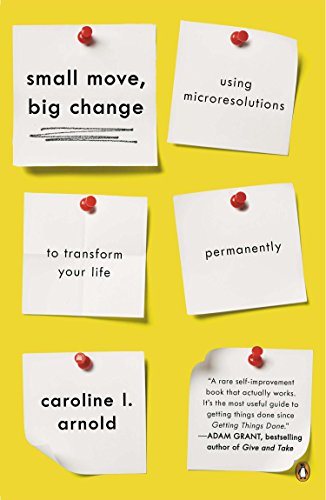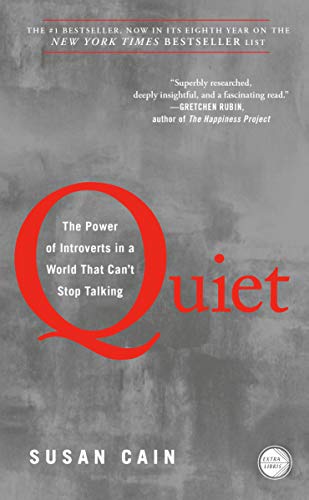(Part 3) Top products from r/selfimprovement
We found 21 product mentions on r/selfimprovement. We ranked the 169 resulting products by number of redditors who mentioned them. Here are the products ranked 41-60. You can also go back to the previous section.
41. Self-Made Man: One Woman's Year Disguised as a Man
Sentiment score: -1
Number of reviews: 1
 Show Reddit reviews
Show Reddit reviews42. The Brain That Changes Itself: Stories of Personal Triumph from the Frontiers of Brain Science
Sentiment score: 1
Number of reviews: 1
lucid fascinating mind brain
 Show Reddit reviews
Show Reddit reviews43. The 48 Laws of Power
Sentiment score: -1
Number of reviews: 1
The 48 Laws of Power
 Show Reddit reviews
Show Reddit reviews44. Small Move, Big Change: Using Microresolutions to Transform Your Life Permanently
Sentiment score: 1
Number of reviews: 1
 Show Reddit reviews
Show Reddit reviews45. Getting Things Done: The Art of Stress-Free Productivity
Sentiment score: 0
Number of reviews: 1
Getting Things Done The Art of Stress Free Productivity
 Show Reddit reviews
Show Reddit reviews46. Better Never to Have Been: The Harm of Coming into Existence
Sentiment score: 1
Number of reviews: 1
Oxford University Press USA
 Show Reddit reviews
Show Reddit reviews47. Discourses, Fragments, Handbook (Oxford Worlds Classics)
Sentiment score: 1
Number of reviews: 1
Oxford University Press USA
 Show Reddit reviews
Show Reddit reviews48. Quiet: The Power of Introverts in a World That Can't Stop Talking
Sentiment score: 1
Number of reviews: 1
Quiet The Power of Introverts in a World That Can t Stop Talking
 Show Reddit reviews
Show Reddit reviews49. The Wisdom of Insecurity: A Message for an Age of Anxiety
Sentiment score: 1
Number of reviews: 1
The Wisdom of Insecurity A Message for an Age of Anxiety
 Show Reddit reviews
Show Reddit reviews50. How to Think Like Leonardo da Vinci: Seven Steps to Genius Every Day
Sentiment score: 1
Number of reviews: 1
Dell Publishing Company
 Show Reddit reviews
Show Reddit reviews51. The Shock Doctrine: The Rise of Disaster Capitalism
Sentiment score: -1
Number of reviews: 1
neo-liberal economics in actionthe Chicago School of economicsdisaster capitalilsm
 Show Reddit reviews
Show Reddit reviews52. The Memory Book: The Classic Guide to Improving Your Memory at Work, at School, and at Play
Sentiment score: 0
Number of reviews: 1
The Memory Book
 Show Reddit reviews
Show Reddit reviews53. Games People Play: The Basic Handbook of Transactional Analysis.
Sentiment score: -1
Number of reviews: 1
Great product!
 Show Reddit reviews
Show Reddit reviews54. Train Your Mind, Change Your Brain: How a New Science Reveals Our Extraordinary Potential to Transform Ourselves
Sentiment score: 1
Number of reviews: 1
 Show Reddit reviews
Show Reddit reviews55. Full Catastrophe Living (Revised Edition): Using the Wisdom of Your Body and Mind to Face Stress, Pain, and Illness
Sentiment score: 1
Number of reviews: 1
Full Catastrophe Living: Using the Wisdom of Your Body and Mind to Face Stress, Pain, and Illness
 Show Reddit reviews
Show Reddit reviews56. How to Have a Beautiful Mind
Sentiment score: 1
Number of reviews: 1
Ebury Press
 Show Reddit reviews
Show Reddit reviews57. King, Warrior, Magician, Lover: Rediscovering the Archetypes of the Mature Masculine
Sentiment score: 0
Number of reviews: 1
Great product!
 Show Reddit reviews
Show Reddit reviews58. Awareness: The Perils and Opportunities of Reality
Sentiment score: 1
Number of reviews: 1
Doubleday Religion
 Show Reddit reviews
Show Reddit reviews

I had practiced meditation for many years before watching the video, but I had not focused much attention on happiness while meditating. Thus, while benefiting to some extent from meditation, I had not realized the potential benefits of monitoring my levels of happiness while meditating. Before watching the video, I had monitored my thoughts, but I didn't pay much attention to my emotions, other than to notice how negative emotions often led to more intrusive thoughts, making meditation more difficult.
Also, I noticed in the video that the experiments performed using the "Olympic champions of mind training" as subjects, asked them, "to put their mind in a state where there's nothing but loving kindness, total availability to sentient being," later described as meditating on compassion. After watching the talk, I began to explore different ways to meditate with a compassionate perspective. I had done some of that kind of meditating before I saw the talk, but after seeing the talk, I began to put more emphasis on compassion in my meditations.
Something clicked for me about this part of the talk that made so much sense when I heard it. I had already noticed in my life how it made me happy when I did things to help others. So, I could see how maintaining a compassionate perspective during meditation could have happiness benefits. It made sense that putting something like that into practice on a daily basis could have significant benefits. Plus, as I learned from the talk, scientific experiments even offered evidence for that idea. This led me to begin experimenting with how I meditated. I started monitoring my level of happiness while meditating and I began to explore many different ways to meditate with a compassionate perspective.
Finally, I did not miss the point made at the end of the talk about the importance of putting our compassion into action. I found that by focusing on compassion during meditation, it made me a more compassionate person. In my day to day activities, I watch for opportunities to do even small things that help others. Again, I know that my level of happiness benefits from those acts of kindness. Our lack of compassion makes us less happy and our acts of compassion make us more happy.
If you find the talk interesting, I recommend reading, Train Your Mind, Change Your Brain: How a New Science Reveals Our Extraordinary Potential to Transform Ourselves. The author, Sharon Begley, is a journalist who served as the science editor and science columnist for Newsweek. The book describes the relatively recent history of scientific discoveries about neural plasticity. The book goes into great detail about the back story behind the brain scan experiments performed on Buddhist meditators. I found it a well written tale, with a firsthand account of regular meetings where western scientists met with the Dalai Lama to have discussions about the consensus of scientists on topics related to mind training.
Check out this book. Also a good Ted talk by Susan Cain as well.
http://www.amazon.com/Quiet-Power-Introverts-World-Talking/dp/0307352153.
It's great for introverts or extroverts who want to better understand their introverted friends or loved ones. Also there are some great mindfulness exercises out there that could help too. Best of luck. :)
"How to have a Beautiful Mind" by Edward Debono
http://www.amazon.co.uk/How-To-Have-Beautiful-Mind/dp/0091894603
"How to Win Friends an Influence People" by Dale Carnegie
Download FREE here (see the red text, you don't need to sub to the list there)
http://hotblogtips.com/how-to-win-friends-and-influence-people
I've read this book multiple times. I was EXTREMELY shy and introverted as a kid, this book really helped me with practical suggestions and ideas that anyone can apply.
Do what you love, and you will find people who enjoy what you enjoy.
Don't change yourself to suit other people.
Be true to yourself, and remember that you are perfect just as you are right now, you are a complete and whole human being who is here on purpose.
What you are describing isn't so much a mental state as it is a philosophical position. There are quite a few people, myself included, who believe people are better off not being born and that, consequently, bringing new sentient life into existence is a moral wrong. This position is called antinatalism and it is very rigorously argued for in Better Never to Have Been by philosopher David Benatar. (Here's an audio interview with him.) There's even a subreddit for antinatalism.
In antinatalism, it's very important to make the distinction between life that hasn't yet been started and life that has. While I can say it would have been better for me to never have existed, now that I do exist, I very much wish to continue existing. I didn't choose life, I was forced into it, but I try to make the most of the cards I've been dealt.
Edit. Also, the flip side of this is that I don't owe life, God, my parents or the cosmos anything, least of all my gratitude for being alive. I don't have any obligation to feel happy. Any feelings of gratitude or happiness are for my own benefit, and if I choose to leave early, I'm not being a poor guest.
Hello, fellow long-time depression sufferer.
Sorry to pry, but why is your access to mental health care limited? For me, getting a prescription for an SSRI was the magic bullet I needed to build the momentum to get everything else into place.
Anyway, you asked for information on habits. IMHO, this book is a very good one for building sustainable habits. But depending on how debilitating your depression is, that might be a little high-level. (I know it certainly would have been at my low points.)
This reddit post is an excellent foundation for mindset.
As for depression, while I really, truly hope we can find you some professional mental-health care, here are the three pillars I used to pull myself up. Once you build these habits, you should have the energy you need to build others.
I can go off on any of these topics for as long as you're willing to read, so LMK if you want more details, theory, whatever behind any of this, habit formation in general, or if you just want to talk about your depression. It sucks, I know, but I love how you're looking at the problem. I wish I had the perspective you do, back when I was in the dark.
The Wisdom of Insecurity by Alan Watts (really, anything by Alan Watts) and The Unteathered Soul by Michael Singer. They're more commonly found under zen or Buddhism than Self Help though. For me they were the most helpful in gaining control of one's emotions and thoughts, as well as self acceptance and happiness in one's life as-is, rather than any unreachable goals or futures.
Well, it sounds like patience might be the first virtue to cultivate. Epictetus is a good starting point :)
You're welcome. My dad's a G.P. and he got copies of these for every one in my family. They are amazing.
Other good ones to look at are:
And for a refreshingly new approach:
Because this is one of the best responses I've read on this website, I'm just gunna add a bit rather than write my own.
There's one thing I feel you missed which was key to my personal self-improvement too: paying attention. It sounds like OP is really putting effort into trying to remember things (by writing stuff down etc.) but if her full attention isn't on listening to the instructions at the time (say you're distracted by your own thoughts or attention is elsewhere), it's not going to be retained very well. It can make a world of difference.
OP may also want to get on board how awesome making/learning from mistakes and asking questions actually are. As I try to say to others - they're two of the greatest self-building tools that we have.
"The master has failed more times than the beginner has even tried"
"Everybody is a genius but if you judge a fish by its ability to climb a tree, it will forever think it is stupid."
And get this if you can afford it/torrent it.
As mentioned about Carnegie is a must. Otherwise I'd recommend King, Warrior, Magician, Lover, Staying Healthy with the Seasons (some of the nutrition info is out dated but the core of the book is still great), The Book of Five Rings.
GTD without a doubt.
everything you need
you can also find a lot of Harry Lorayne books on the pirate bay if that's your thing
but here are some specific techniques: building and using a peg system, the mnemonic major system (remembering numbers), memory palace/method of loci
they take 10-20 minutes each to learn and they get faster to implement each time you do it. I memorize three things a day (almost always using a peg and the mnemonic major system.) I also need to memorize a standup act occasionally and for that I will use the memory palace.